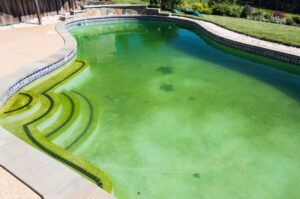Taking the plunge in your swimming pool’s clear, cool water is one of the simple pleasures of home ownership. However, maintaining that crystal clarity in your pool water is not just about aesthetics. It’s a hallmark of safety, reflecting a well-maintained pool where the water is free from organic contaminants and algae growth. When it comes to pool care, achieving water clarity and ensuring safety is largely about the chemistry. One of the essential steps in residential pool resurfacing and maintenance is understanding the role of oxidizers.
Oxidizers like pool shock oxidizers play a pivotal role in keeping your pool water pristine. These substances are crucial in breaking down organic matter, such as body oils, sweat, and other contaminants brought in by swimmers or the environment. They sanitize the water by killing bacteria and algae. Thus, maintaining a clean pool is essential for a safe and enjoyable swim. The process of shocking, which employs a shock oxidizer, is a potent way to super chlorinate pool water, destroying chloramines that cause the notorious chlorine smell. This process is a routine yet essential aspect of pool maintenance that ensures the pool water remains safe and inviting.
In this blog, we’ll dig deeper into the world of oxidizers. So, if you’re looking to keep your pool clear and clean, ready for a dip anytime, stick around as we unravel the chemistry that keeps your pool inviting and safe year-round.
Table of Contents
ToggleWhat are Pool Oxidizers?
Keeping your swimming pool sparkling clean isn’t just about aesthetics. It’s about maintaining a safe and healthy environment for swimmers. Pool oxidizers play a crucial role in this aspect of residential pool resurfacing and maintenance. Let’s look into how they function and interact with other chemicals to keep your pool water pristine.
Working Mechanism
Oxidizers work by initiating a chemical reaction that burns up inactive particles and organic contaminants like body oils, sweat, and algae. This process is crucial for improving water clarity and making your pool inviting.
Pool shock oxidizers, for instance, are fast-acting chemicals that help break down these contaminants swiftly, restoring the crystal-clear appearance of your pool water.
Synergy with Sanitizers
Oxidizers and swimming pool sanitizers are the dynamic duos in pool care. While oxidizers deal with inactive particles, sanitizers, like chlorine or bromine, actively kill bacteria and other harmful microbes.
When you apply a shock treatment, the oxidizer works to eliminate combined chlorine (chloramines), which is responsible for the notorious chlorine smell and eye irritation. This makes sanitizers more effective as they can work in a cleaner environment.
Enhanced Effectiveness
The symbiotic relationship between oxidizers and sanitizers is essential for maintaining the overall water quality in swimming pools. Moreover, an automatic chlorinator can help maintain proper levels of these chemicals, ensuring a clean, clear, and safe swimming environment.
Maintaining the right balance of oxidizers and other sanitizers is crucial for keeping your pool ready for a relaxing swim or an impromptu pool party. And while we’re on the topic, don’t overlook the importance of regular pool resurfacing to keep the structure sound and the water sparkling clear. Understanding the role of oxidizers and how they interact with sanitizers will provide you with a clear pathway toward achieving a well-maintained pool, paving the way for endless fun and relaxation in your backyard oasis.
Signs Your Pool Needs an Oxidizer
A shimmering, clean pool is the hallmark of great pool care, and using oxidizers judiciously is a big part of that. However, recognizing when your pool is crying out for an oxidizer is key to maintaining its allure and safety. Here are some tell-tale signs and professional advice on the frequency of oxidizing treatments.
Unpleasant Odors and Irritations
A strong chlorine smell is often a sign of combined chlorine or chloramines, which indicates that it’s time for a shock treatment with a pool shock oxidizer to break down these irritants.
Swimmers experiencing skin irritations or red eyes after a swim are another indicator that your pool might need an oxidizer to improve water quality.
Cloudy or Green Water

Cloudy water is usually a result of organic contaminants, while green water indicates algae growth. Both scenarios call for an oxidizing treatment to restore water clarity and prevent further issues.
Professional Oxidizing Frequency
It’s advisable to have professional oxidizing treatments on a weekly basis, especially during peak swimming seasons. This frequency ensures that the water remains clear and safe for swimmers.
For a salt water pool or fiberglass pool, consulting with a pool industry professional for a tailored oxidizing schedule is wise, as the material of the pool and the type of water can affect oxidizer needs.
Residential pool resurfacing and maintenance is a meticulous task, but it’s essential for the longevity and safety of your swimming pools. Noticing the signs that your pool water is changing or becoming uncomfortable for swimmers is crucial.
Engaging professionals for regular oxidizing treatments, alongside other pool repair and maintenance tasks, ensures that your pool remains a safe and enjoyable haven year-round. Your pool is more than just a body of water; it’s a reflection of the care and attention you invest in it. Hence, timely oxidizing treatments are fundamental in presenting a clean, clear, and inviting pool to family and friends.
Benefits of Oxidizing Services for Your Residential Pool Resurfacing
Maintaining a sparkling clean pool can be a time-consuming task, but one that is crucial for ensuring the safety and enjoyment of your swimming sanctuary. While residential pool resurfacing is a key aspect of pool maintenance, the chemical balance of your pool’s water is equally important. Here’s where professional pool oxidizing services step in, offering a myriad of benefits:
Expertise
Professionals are well-versed in handling chemicals like pool shock oxidizer, granular chlorine, and non-chlorine shock, ensuring they are used effectively to maintain your pool’s ideal chlorine levels and pH levels.
They understand the intricacies of different pools, whether fiberglass pools or traditional concrete ones and can tailor the oxidizing process accordingly.
Efficiency
A professional service will have the right tools and chemicals on hand, ensuring a swift and thorough oxidizing process. This is especially beneficial after a pool party when the pool’s water might have a higher level of contaminants.
With their professional insight, they can quickly identify and rectify issues such as algae bloom or cloudy water, restoring your pool to its pristine condition faster than a DIY approach.
Safety
Handling pool chemicals can be hazardous. It is the responsibility of professionals to handle these substances safely, ensuring no harm comes to you or your pool.
They also ensure that the pool oxidizer is suitable for your pool, preventing any adverse reactions that could harm the pool surface or filtration system.
In a scenario where your pool water turns murky after a heavy downpour, a professional can promptly administer the necessary shock treatment, restoring the clarity and safety of your water. Similarly, if you are hosting weekly swim sessions or pool parties, having a professional service on call ensures your pool remains clean, safe, and ready for fun.
Professionals’ proficiency and peace of mind are unparalleled, making them a worthy investment for any discerning pool owner.
Choosing the Right Oxidizers for Your Pool
The journey towards achieving a crystal clear swimming pool begins with choosing the right oxidizers. These chemicals are crucial not only for maintaining water clarity but also for ensuring that the process of residential pool resurfacing yields long-lasting results. Here’s a simplified guide to help you make an informed choice:
Types of Oxidizers
- Chlorine-Based Oxidizers: Commonly used, they are effective in breaking down organic contaminants. They come in various forms, like granular chlorine, chlorine tablets, or liquid chlorine.
- Non-Chlorine Oxidizers: These are suitable for pools and spas and are often preferred for being less harsh on the skin and eyes. They are great for a quick shock treatment without altering chlorine levels.
- Hydrogen Peroxide: A gentler option often used in hot tubs. It’s less aggressive but effective in maintaining a clean pool environment.
Considerations for Selection
- Pool Size and Usage: Larger pools or heavily used pools may require stronger or more frequent oxidizing treatments.
- Existing Water Conditions: Assessing the current chlorine levels, pH level, and the presence of chloramines will guide the choice of oxidizer.
- Pool Material: The material of your pool, be it fiberglass or concrete, may react differently to various oxidizers. Hence, choose accordingly.
The right oxidizer not only ensures a sparkling clean pool but also enhances the effectiveness of your pool sanitizers, reducing the need for additional chemicals or additional cleaning.
Dive into Clarity: Your Pool’s Best Friend

In wrapping up, the importance of a well-maintained pool can’t be overstated. Engaging Professional Aquatic Services, a reliable pool resurfacing company for your oxidizing needs. They ensure your pool remains inviting. Whether it’s a pool equipment upgrade or a pool repair, a professional touch is key to an enduring, clear, and safe swimming haven. Your pool’s clarity is a call away!

